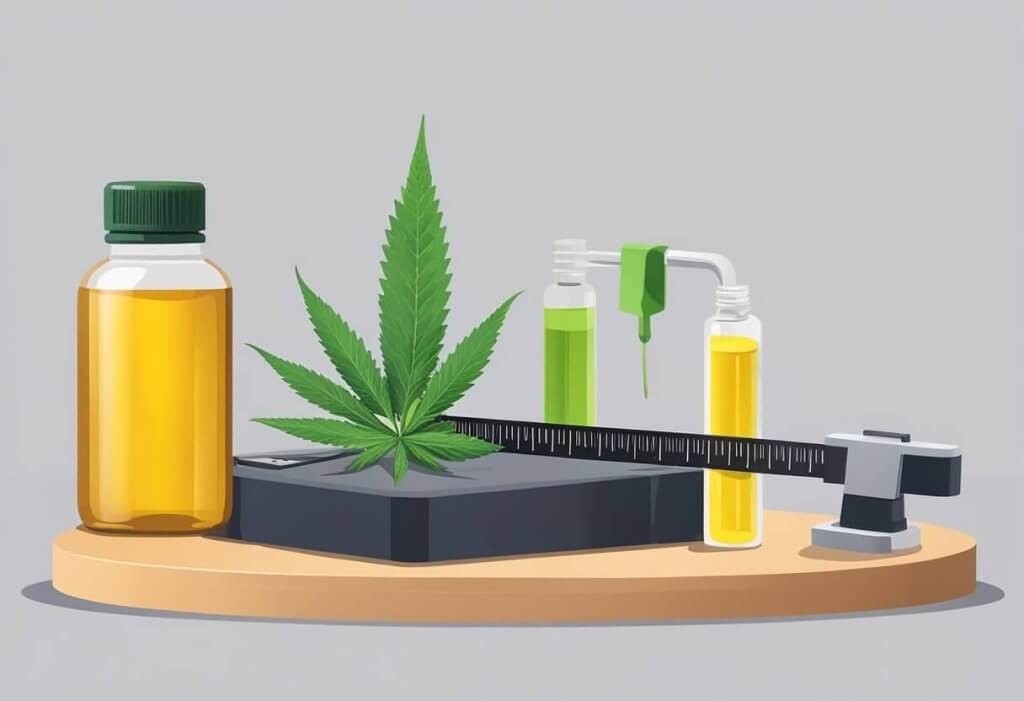Unpacking the Facts
Disclaimer: The anecdotal benefits of CBD mentioned on this website are based on preliminary research and individual user experiences. All information presented here is not meant to substitute for or replace information from health care practitioners. Please click here for our full disclaimer, including side effects, FTC position, etc.
Are you struggling to shed those stubborn pounds? You’re not alone. Many people find that traditional weight loss methods fail, leaving them frustrated and searching for alternative solutions.

If you’ve been exploring natural ways to support your weight loss journey, you may have come across CBD, or cannabidiol. This non-intoxicating compound derived from the cannabis plant has garnered significant attention in recent years for its potential health benefits, including its role in weight management.
While CBD is not a magic bullet for weight loss, a growing body of research suggests it may help regulate appetite, reduce inflammation, and support a healthy metabolism. By interacting with the body’s endocannabinoid system, CBD may help promote balance and well-being, making it easier to stick to a healthy lifestyle.
In this article, we’ll dive deeper into the science behind CBD and weight loss, exploring how this fascinating compound may help you achieve your goals and maintain a healthy weight in the long term. Whether you’re just starting your weight loss journey or looking for new strategies to complement your existing efforts, read on to discover how CBD could be the natural ally you’ve been searching for.
Key Takeaways
- CBD’s potential effects on weight loss are supported by anecdotal accounts and interest is growing.
- Reducing appetite and cravings are common benefits reported by CBD users.
- CBD should be viewed as a component of a broader health and wellness regimen.
Potential Indirect Benefits of CBD for Weight Loss
| Benefit | Mechanism |
|---|---|
| Reduced Anxiety | May prevent stress/emotional eating |
| Improved Sleep Quality | Can regulate metabolism and appetite hormones |
| Anti-inflammatory Effects | Could boost exercise recovery and endurance |
Understanding CBD and Its Role in Weight Loss

Cannabidiol (CBD) has been extensively researched for its potential health benefits. Unlike its cousin THC, CBD does not produce any psychoactive effects and has been investigated for its role in aiding weight loss.
CBD vs. THC: Effects on Appetite and Weight
THC, the primary psychoactive compound in cannabis, is well-known for stimulating the appetite, which is often referred to as “the munchies.” However, CBD, which is derived from hemp or marijuana, does not have this effect.
Studies suggest that CBD might actually have the opposite effect – reducing appetite and potentially aiding in weight management. This is a key distinction for those considering cannabinoids as part of their weight loss regimen.
The Science of CBD
The scientific community is exploring how CBD might influence weight. Preliminary research indicates that CBD might boost metabolism and decrease food intake. This could be related to how different cannabinoids interact with receptors in the body’s endocannabinoid system (ECS), which manages various physiological processes, including hunger and metabolism.
Fact: While CBD itself does not directly cause weight loss, it may aid weight loss indirectly by reducing anxiety and improving sleep, both of which can contribute to overeating.
https://www.forbes.com/health/cbd/cbd-for-weight-loss/
The Endocannabinoid System Explained
The ECS is a complex network of receptors and neurotransmitters found throughout the body. It helps regulate balance and homeostasis in numerous systems, and it comprises two main receptor types: CB1 and CB2.
While THC binds mainly to CB1 receptors, which can increase appetite, CBD is thought to interact differently with the ECS, possibly by influencing other molecules to block off these receptors. This could theoretically help to curtail appetite and encourage weight loss.
The relationship between cannabinoids and the ECS is still a major area for research in understanding the full implications of CBD on weight management.
Exploring the Health Benefits of CBD for Weight Loss

Recent attention has turned to CBD’s potential role in aiding weight loss by influencing metabolism, fat type conversion, pain management, and sleep.
CBD and Metabolism: Boosting Your Burn
Research indicates that CBD might boost metabolism, which can lead to weight loss. CBD might also make it easier for people to burn more calories, even while at rest, by enhancing the body’s ability to convert food into energy.
One study suggests that CBD could be involved in mitochondrial function and thermogenesis, processes that are crucial for burning calories.
White Fat vs. Brown Fat: CBD’s Influence
The body has two types of fat: white and brown. White fat stores energy and is linked with issues like obesity and heart disease, while brown fat burns calories and generates heat.
CBD is thought to influence the conversion of white fat into brown fat, a process that may improve the body’s capacity to burn calories and reduce the risk of obesity.
Managing Pain and Inflammation for Weight Loss
Individuals dealing with chronic pain and inflammation often find exercise difficult, leading to a sedentary lifestyle, which can contribute to weight gain.
CBD’s potential effects on pain relief might reduce inflammation and pain, paving the way for these individuals to engage in more physical activity and, as a result, support weight loss.
“There is still a lack of evidence showing CBD alone is an effective therapy for weight management. However, CBD does seem to have other benefits like reducing inflammation and anxiety that could make weight loss easier.” (Source)
Samantha Cassetty, MS, RD
CBD and Sleep: A Recipe for Weight Loss?
Poor sleep can lead to weight gain, increased hunger and cravings, and higher calorie consumption.
CBD is widely recognized for its possible benefits in improving sleep and reducing stress and anxiety. It may indirectly support weight loss by promoting better sleep patterns and reducing sleep-related disruptions.
Promising Study: A 2018 study on rats found that CBD increased proteins involved in promoting brown fat, suggesting it could help burn calories and reduce weight gain over time when combined with other therapies.
https://www.ncbi.nlm.nih.gov/pmc/articles/PMC6313151/
Frequently Asked Questions

This section addresses common inquiries on CBD’s role in weight loss, including its effects on metabolism and fat reduction.
Can CBD help speed up metabolism?
Research indicates that CBD may affect metabolism, potentially boosting metabolism and reducing food intake in animal studies.
Are there any studies showing CBD can lead to weight reduction?
While concrete evidence in humans is scarce, some preliminary research suggests CBD could help with weight loss by impacting various metabolic functions.
What’s the connection between CBD oil and appetite suppression?
CBD oil may influence the endocannabinoid system, leading to appetite suppression, although this response may vary among individuals.
How does CBD impact body fat?
CBD may interact with fat cells, potentially aiding in the breakdown of fat and reducing lipid storage, which points to its potential for impacting body fat.
Are there specific ways to use CBD for weight management?
For those using CBD for weight management, options range from oils to capsules, and no specific method has been proven to be the most effective.
What do experts say about using CBD for dieting purposes?
Experts suggest caution and more research when considering CBD for dieting purposes. The long-term effects and efficacy are not fully understood.
“I started taking CBD oil daily to help manage my anxiety, but I noticed an unexpected benefit – I felt much more in control of my cravings and had an easier time making healthier food choices.”
Meghan T., CBD user

